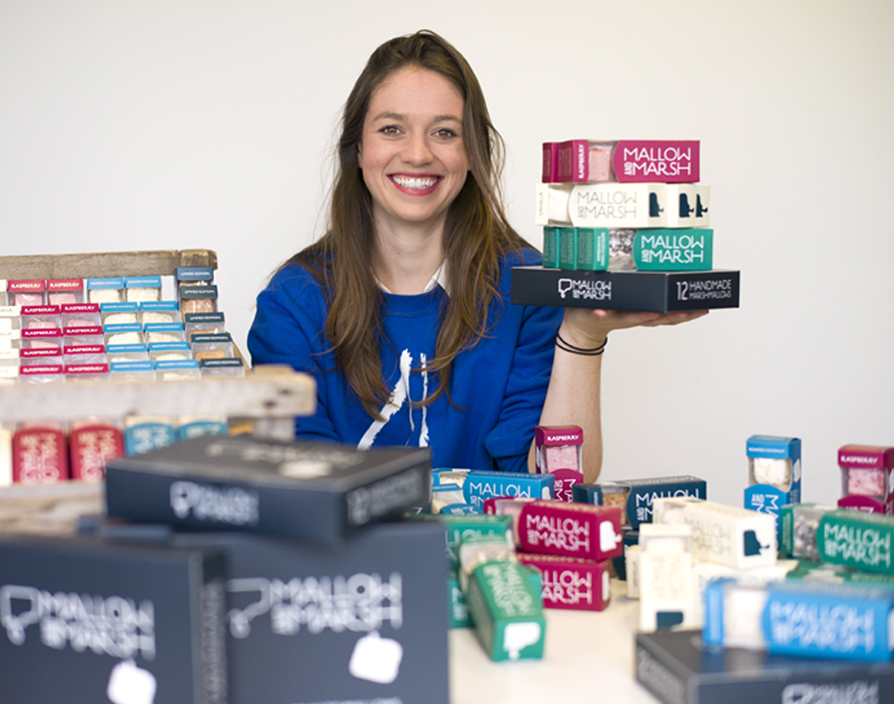Harriot Pleydell-Bouverie, founder of Mallow and Marsh, the gourmet marshmallow company, didn’t always have her eyes set on becoming an entrepreneur. However, her parents had a good idea of where her future lay. It all started on a holiday to Kenya when a young Pleydell-Bouverie was given £5 to spend in a flea market. “My father thought I was going to come back with a lollipop but I came back with an enormous bag of copper wire bracelets,” she says. “I took them back to school and sold them for a pound each, which, without a shadow of a doubt, was one of the most profitable things I have ever done in my life.”
These entrepreneurial stirrings developed into something more significant a few years later. At the age of 18, Pleydell-Bouverie dropped out of art college and took a job at a headhunting firm in the City. But, as the credit crunch struck and her company was moved onto a four-day week, Pleydell-Bouverie decided to strike out on her own; she quit her job and set up De Bouverie, an online community for independent jewellers. The start-up costs were covered by three months’ gardening leave pay, the result of agreeing to join a competitor of her former employer. “Rather than going travelling, which is what most people do on their gardening leave, I sat down with a lot of business books around me,” Pleydell-Bouverie laughs.
While Pleydell-Bouverie was incredibly passionate about her new business, a weekend away with Campus London, Google’s co-working initiative for start-ups, delivered her an even more exciting opportunity. “We were there talking about marshmallows and everyone was saying they could never make them at home,” says Pleydell-Bouverie. “And I was like, ‘You know what, guys? I reckon I could.'”
Along with two members of her team, Pleydell-Bouverie spent most of the night cooking up all sorts of concoctions. “It was all a bit haphazard but we brought them back the next day and I had literally never seen a reaction like it,” Pleydell-Bouverie says. “I had just spent 18 months of my life trying to get that reaction to De Bouverie and I had just got it in two hours from making marshmallows.”
It was time to wave goodbye to De Bouverie but Pleydell-Bouverie’s first start-up experience had certainly stood her in good stead. “De Bouverie was brilliant,” she says. “I call it my MBA for start-ups. I made every mistake in the book but I wouldn’t change it for the world because it taught me to get going and gave me the base that I needed.”
In February 2013, Pleydell-Bouverie took a look at the marshmallow market. And, while there did appear to be space for a company like Mallow and Marsh, one suspects the entrepreneur would have persevered regardless. “To be honest, the main thing that kept me going was my love of cooking and experimenting with marshmallows,” she admits.

Suffice to say, Pleydell-Bouverie’s marshmallows are a far cry from the pink and white numbers we tend to enjoy over a fire or atop a hot chocolate. “A lot of people are very surprised because ours are square, not rounded like the ones you buy in the supermarket,” says Pleydell-Bouverie. “We pour the mixture into big slabs, set them overnight and chop them up. That’s why you get cubes rather than a circular edge, which is produced when mallow is squeezed out of a tube and cut with a knife.”
Mallow and Marsh’s mallows are also markedly bigger than their counterparts. Coming in packs of three, they’re more of an indulgence than a sweet treat for scoffing. “We sit between marshmallow and nougat, whereas a lot of the others are very fresh dough, very light, and you can comfortably eat 25 or 30 of them because they just dissolve,” Pleydell-Bouverie explains. “With ours, you’re getting a bite every time, which means you want to eat less of them.”
Having started the business for £250, Pleydell-Bouverie soon set about selling her marshmallows at market stalls, with flavours ranging from peppermint and dark chocolate all the way through to raspberry. But one flavour proved more popular than all of the others. “I was sharing the kitchen with somebody who made coconut ice,” says Pleydell-Bouverie. “They had a lot of coconut and asked if I wanted to try and make a coconut marshmallow. I hate coconut but I thought, ‘Why not?’ It sold out that day and it’s been my best-seller ever since.”
Something else that’s stuck despite Pleydell-Bouverie’s initial scepticism is the name of her company. “I actually didn’t like it when I launched,” she says. However, being told with two days’ notice she had a stall at Jamie Oliver’s Food Revolution in Borough Market didn’t leave the entrepreneur much time to consider alternatives. “We just picked it and I thought, ‘I’ll rebrand it next week and no-one will know,’ but I never did.”
Around the same time that Mallow and Marsh began trading at markets, an opportunity with Sainsbury’s came to Pleydell-Bouverie’s attention; the retailer was running a Dragons’ Den-style competition for food and drink start-ups called #pitchup. “I went to a food networking event and someone told me I should apply,” she says. After a gruelling few rounds, Pleydell-Bouverie ended up winning the competition and, with it, a contract with Sainsbury’s.
While the business wasn’t yet at a stage to fulfil the contract, Sainsbury’s agreed to put the launch date back by six months, giving Playdell-Bouverie time to stump up some much-needed cash. “When I won the Sainsbury’s contract, I realised that I needed investment because I had to be able to grow and market the product,” she says. “It’s one thing getting it onto a supermarket shelf but, for me, the scariest part was getting it off the other side.”

In addition to sounding out private investors, Pleydell-Bouverie also applied for Dragons’ Den. “A lot of people said it’s worth starting that process because it forces you to get things into line,” she says. “It is almost like having a sounding board so you can get your investment deck ready. If you’re ready for the Dragons, you’re also ready for anyone else.”
Pleydell-Bouverie ended up getting her 15 minutes of fame but, in an act of bravado and stubbornness, the entrepreneur turned down offers from Deborah Meaden and Peter Jones, both of whom were seeking a significantly bigger equity stake than the 10% she was willing to part with. ‘I was very clear on what I thought I was worth and what I thought the company was worth,” says Pleydell-Bouverie. “I really wanted Deborah but I just didn’t feel that the offer was reflective of the company.”
The decision paid off: Pleydell-Bouverie went on to raise £150,000 from private investors and a Kickstarter campaign, sacrificing 15% of her business in the process.
A year later, the company has just completed its rollout in Sainsbury’s and its new marshmallow bars – two of which are smothered in chocolate – are set to hit stores imminently. “The mini boxes are more of a treat whereas the bars are far more impulse,” explains Pleydell-Bouverie. Meanwhile, consumers can continue to enjoy Mallow and Marsh’s original treats, either on their own or dunked in something else. “A biscuit isn’t just a biscuit,” says Pleydell-Bouverie. “You can dunk it in tea and it’s that kind of idea with marshmallows. It’s about the experience of the brand as much as the actual product itself.”
Mallow and Marsh is certainly on the right track but, like many entrepreneurs, Pleydell-Bouverie has had to stare failure in the face along the way. The near-fateful moment came during the August 2013 heatwave when she lost a lot of marshmallows to the high temperatures. “It turns out marshmallows melt like chocolate and I definitely didn’t know that,” she says. “It could have been that moment where I said ‘Is this worth it?’ and stepped away because it was quite stressful.”
Thankfully, Pleydell-Bouverie’s entrepreneurial spirit saw her through and she’s now focused on taking her fast-growing confectionery company to new heights. “I have a book of ideas,” she says. “For now, we are definitely a marshmallow brand but we do want to help premiumise the confectionery category. Pushing the boundaries of where the flavours can go is quite exciting for me.” ![]()
Share via:


















































